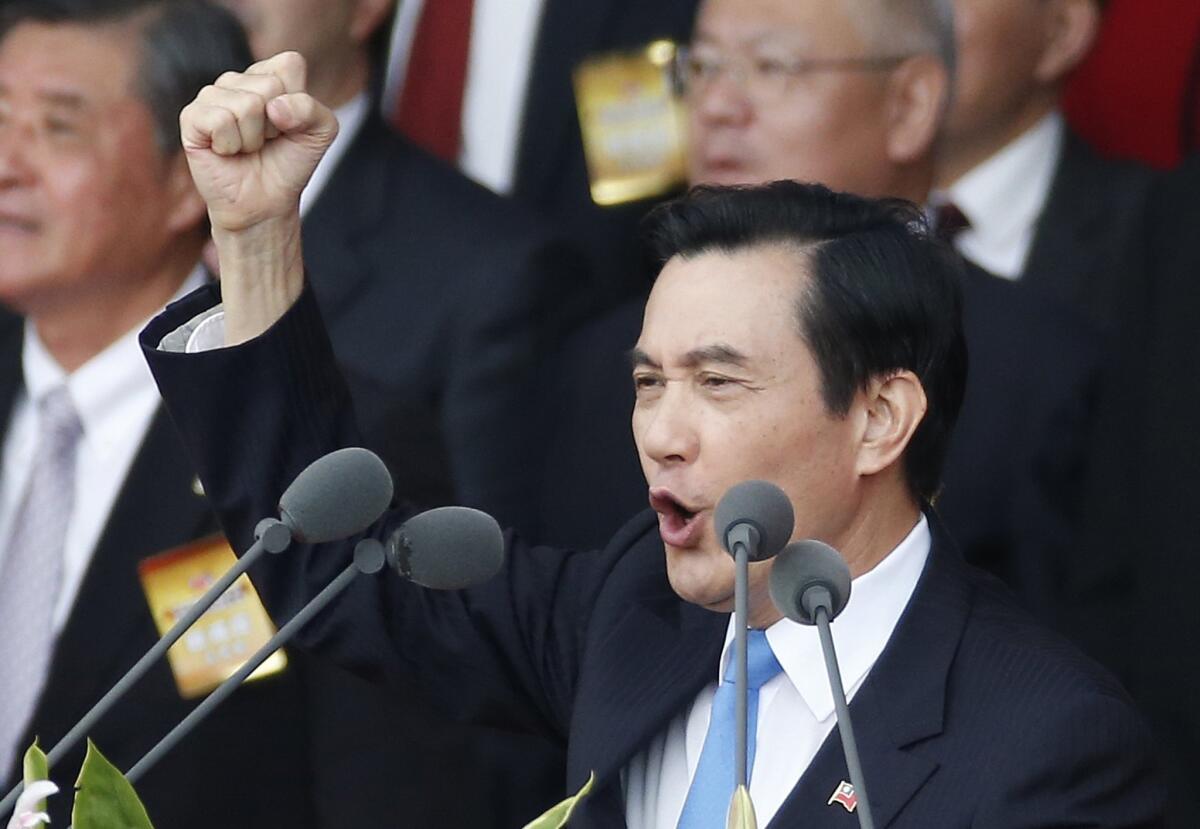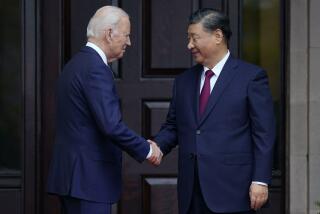Leaders’ planned talks a first for China and Taiwan since 1949 split

Taiwanese President Ma Ying-jeou, shown delivering the keynote speech during the National Day celebrations in Taipei, Taiwan, on Oct. 10, reportedly will meet with his Chinese counterpart, Xi Jinping, in Singapore on Nov. 7.
Separated by just 100 miles of sea, but a chasm of war, history and politics, the leaders of mainland China and Taiwan have never met face-to-face since the two sides split in 1949 after a long and bitter civil war.
But on Saturday, Taiwanese President Ma Ying-jeou will confer directly with Chinese President Xi Jinping in Singapore, the two governments have announced, a bold move that could push the two sides closer together or drive them even further apart.
Official news agencies for both sides sought to downplay expectations for the meeting. The two presidents will exchange views on “consolidating cross-strait peace and maintaining the cross-strait status quo,” Taiwan’s Central News Agency said, and no statement or agreement is planned.
Zhang Zhijun, Beijing’s top official for Taiwan affairs, called the talks a “pragmatic arrangement” but noted that “political differences” have not been resolved, the mainland’s New China News Agency said.
Still, the meeting was immediately described as a historic breakthrough, given the decades of dangerous animosity between Taiwan and the mainland. And it comes just before the presidential election on the island of 23 million, which after decades of dictatorship has transformed into one of Asia’s most vibrant democracies.
The mainland’s communist government has always regarded Taiwan as a renegade province that must eventually be brought under Beijing’s control, by force if necessary. Taiwan, which long saw itself as the sole legitimate government of all of China, has resisted unification under Beijing’s rule.
In recent years, under Ma’s administration, the two sides have established direct flights across the Taiwan Strait and developed strong economic ties, but have remained at loggerheads over Taiwan’s status.
The unprecedented meeting would come just two months before January’s vote in which Ma’s Nationalist Party is widely expected to go down to defeat. Democratic Progressive Party candidate Tsai Ing-wen has been ahead in public opinion polls for months, with the Nationalists running a disorganized campaign and recently replacing candidate Hung Hsiu-chu, a teacher-turned-legislator who was drawing as little as 13% support.
Ma, who is finishing his second term, cannot seek reelection.
“Both presidents will be thinking about how to score political points with their home audiences,” said Perry Link, a China scholar at UC Riverside. “Xi Jinping … will be looking to bolster his image at home as somebody who can make the rest of the world salute. Ma Ying-jeou in Taiwan has to face the fact that his KMT Party has lost ground to the Democratic Progressive Party and may lose the next presidential election to them; so he needs to look good too.”
The possibility of the DPP winning the presidency and having a supportive legislature has been stoking anxiety in mainland China.
The Nationalists are the party of the late Gen. Chiang Kai-shek, the Chinese leader who was forced to retreat to Taiwan in 1949 when his forces were defeated by Mao Tse-tung’s communists in the civil war.
Yet despite the Nationalists’ longtime anti-communist stance, Ma has pursued closer economic ties with mainland China. While pleasing business interests, his approach has worried many voters — especially those in their 20s and 30s — who see themselves as distinct from mainland Chinese, fear becoming too fiscally integrated with their giant neighbor and say the closer links have failed to deliver widespread benefits.
Taiwanese look with dread at the experience of Hong Kong, whose “one country, two systems” arrangement with mainland China has stirred resentment and protests by those who believe Beijing is stifling the territory’s attempts at democratic rule.
A DPP win is anathema to Communist Party authorities in Beijing, whose unrelenting stance toward Taiwan has kept it out of the United Nations and other international bodies and left it with a dwindling number of formal diplomatic allies. The DPP has held the presidency once before, from 2000 to 2008 under Chen Shui-bian, and his government’s moves to nudge Taiwan toward formal independence roiled Beijing.
For months, Beijing has been ramping up its rhetoric against Tsai, criticizing U.S. officials for receiving her on a visit to Washington in June.
In August, the state-run Global Times tabloid carried a commentary warning that the DPP advocates Taiwan independence and that “once Tsai assumed office, Taiwan would be heading toward a cliff if the separatists … gain momentum.”
Calling Taiwan independence “nothing but a dead end,” it said the democratic island’s “future will be in jeopardy if it sinks deeper in the daydream.”
J. Michael Cole, editor in chief of Thinking Taiwan, which is affiliated with a foundation established by Tsai, said the Ma-Xi meeting could be an attempt to throw a “curveball” at Tsai before the election. He said the small opposition New Power Party has called for a protest Wednesday outside the legislature in Taipei, the Taiwanese capital.
The Nationalists appear on track not just to lose the presidency for a second time, but also to forfeit control of the parliament. That would be unprecedented since Chiang and millions of his supporters lost the civil war and set up a separate government on the island off the mainland’s southeastern coast.
Taiwanese presidential office spokesman Chen Yi-hsin planned to hold a briefing Wednesday to discuss how the Singapore meeting had come about. Ma will hold a news briefing Thursday, officials told the Central News Agency.
In Washington, the State Department said it welcomed the development and supports efforts by the two governments to work out their differences.
“We welcome all steps,” said Elizabeth K. Trudeau, a department spokeswoman.
Although the United States gave up formal diplomatic relations with Taiwan when it recognized the mainland government in the 1970s, it remains an ally and has pledged to support the island in the event of an attack.
Saturday’s meeting was first disclosed by an opposition newspaper. Ma has since “been in full reassurance mode” to allay public skepticism, said Douglas Paal, a longtime China watcher and former top U.S. official who is now at the Carnegie Endowment for International Peace.
Though the meeting is more important symbolically than for what it might yield in agreements, it is “extremely significant — historic,” Paal said, adding that Ma has sought such a meeting for some time as part of his legacy of better relations with Beijing.
In an August meeting with the Los Angeles Times, Ma highlighted his pursuit of closer Taiwan-mainland relations as one of his signature accomplishments.
“We adhere to the status quo of no unification, no independence and no use of force,” he said.
He said that under his leadership, the two sides had concluded 23 agreements, and mainland tourism to Taiwan had reached record levels.
“The ministers from both sides in charge of cross-strait affairs met with each other on five occasions over the past year and they also addressed each other by their official titles,” he said. “That was the very first time in 66 years and cross-strait relations have been the most stable and peaceful in the last 66 years.”
A DPP spokesman called the timing of the meeting between Ma and Xi questionable, the news agency reported, and demanded an explanation from the ruling party’s candidate.
The Nationalists, or Kuomintang, replaced Hung as their presidential candidate last month with party Chairman Eric Chu.
Gerrit van der Wees of the Washington-based Formosan Assn. for Public Affairs, a pro-Taiwan independence nonprofit group, regarded the meeting with Xi as an effort by Ma to “salvage his legacy” and to turn the tide of the election in Chu’s favor. By meeting Xi, he said, Ma may be hoping to “pin down” Tsai on her policy vis-a-vis Beijing.
Whether the meeting between Ma and Xi will further reinforce negative perceptions among voters that the Nationalists are cozying up to Beijing remains to be seen.
Chu is expected to visit Washington — as well as Los Angeles, New York and San Francisco — next week.
Times staff writer Paul Richter in Washington contributed to this report.
Follow @JulieMakLAT on Twitter for news out of Asia
ALSO
In Damascus, Syrians express a surprising level of optimism
Uber driver in India sentenced to life in prison for raping a passenger
North Korean defector trained in propaganda art now uses it to mock rulers
More to Read
Start your day right
Sign up for Essential California for news, features and recommendations from the L.A. Times and beyond in your inbox six days a week.
You may occasionally receive promotional content from the Los Angeles Times.







